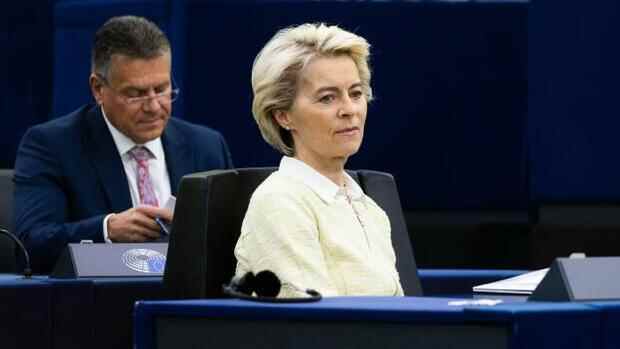There can be no talk of unity in the EU.
(Photo: dpa)
Historically, sanctions have rarely achieved the desired result. As a rule, they have neither significantly changed the attitude of governments, let alone led to changes of government, nor contained or prevented wars. Nevertheless, sanctions are an important instrument. They set a political signal, bringing with them the hope of creating a certain deterrent effect for the future.
The planned oil boycott against Russia is just as legitimate as it is necessary. Russia’s war crimes in Ukraine are too great. The risk that other autocrats will feel motivated to emulate Putin’s method and invade a sovereign neighboring country is also too great. That is why the West should react with all severity.
Unfortunately, however, the European strategists, in their efforts to achieve a lasting sanctions effect, have done just about everything wrong that can be done wrong. Solidarity, speed and at least a certain element of surprise – these are the three necessary prerequisites for sanctions to be effective. As the history of sanctions shows, they are far from sufficient.
None of the three criteria apply to the current oil boycott. There can be no talk of unity: Slovenia and especially Hungary are once again pushing for exemptions because their dependence on Russian oil is simply too great. No trace of speed either: first there was a week-long debate about who would participate in the boycott and to what extent.
Top jobs of the day
Find the best jobs now and
be notified by email.
Russia’s head of state, Vladimir Putin, must have followed them with joy from his Kremlin fortress. Then there are now long deadlines, while the billions continue to flow into the Russian war chest. Billions, of which the chancellor falsely claims that Putin cannot do anything with them because of the financial sanctions.
>> Read also: No more oil from Russia: the most important questions and answers
And the element of surprise, which is intended to deprive the sanctioned party of the opportunity to find alternatives, has completely evaporated after these never-ending debates. The only surprise was that it took the Europeans so long to find a weak compromise that Putin needn’t really fear.
Sanctions have to be designed properly
Overall, the boycott is so poorly made that one should rather speak of a sham embargo. Now it is in the nature of things that in democracies such far-reaching decisions must be preceded by debate. The advantages and disadvantages are weighed up and the long-term effects are thoroughly examined. After all, Germany played an active role for the first time and was not satisfied with the reactive behavior that the Chancellor seemed to have made the maxim of his actions.
Sanctions are right: wars should no longer be worthwhile. However, sanctions must also be designed correctly. The eternal debates unsettle the markets and drive up the price of oil.
EU Commission wants far-reaching oil embargo against Russia
Ultimately, this can lead to the warlord in the Kremlin emerging as the short-term victor of the boycotts because his income is still increasing. The Western allies could have taken precautions on this point, too, by doing more work to persuade the other oil-exporting countries to increase their production quotas.
The best way to avoid an escalation—even a nuclear one, by the way—is with strength and unity. This presupposes the willingness of all those involved to make sacrifices. If the West fails to do this in the most dangerous geopolitical situation in decades, Putin will soon wonder whether the Western alliance would be prepared to defend NATO countries like Lithuania.
More: EU Commission proposes oil embargo against Russia
